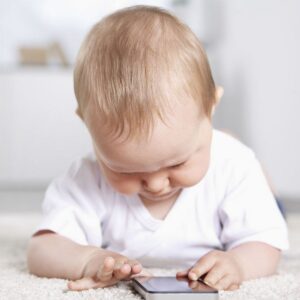Out of the corner of my eye, I observed her with a researcher’s curiosity. Ethnography is the immersive study of people and cultural phenomena, when the researcher is embedded in the social group being studied. As a cyberpsychologist, I am living in a continual ethnographic study. Hardly an hour goes by when I don’t notice how people are interacting with technology.
Ten or fifteen minutes passed. The mother looked exclusively at her phone while the baby fed. The baby was gazing foggily upward, as babies do, and looking adoringly at the mother’s jaw, as the mother continued to gaze adoringly at her device. For half an hour, as the feeding went on, the mother did not make eye contact with the infant or once pull her attention from the screen of her phone.
I couldn’t help but wonder how many millions of mums and dads around the world were no longer looking directly into the eyes of their babies while they were feeding or talking to them. What if that direct eye contact was in fact one-half or one-quarter as much as the days when my generation was raised? How will this seemingly small behavioural shift play out over time? Would a generation of babies be affected? The point is that babies need eye contact – they need face time, and not the app type.
Nobody seems to be even talking about this issue, this real risk, except those with an interest in cyberpsychology, but someday there might be writing on the screen of all mobile phones that says: ‘Warning: Not looking at your baby could cause significant developmental delays’.
The American Academy of Pediatrics discourages screen use, including television, for children under two. No TV for babies. No apps with funny cartoons on a parent’s or babysitter’s mobile phone. And yet there’s been an explosion in electronic media marketed directly at infants, some products are even labelled “suitable from birth”. There is now a multimillion-dollar industry selling computer games for very young children.
Not a toy
The tablet is now ubiquitous as a “toy” for toddlers – and parents often marvel at the swiftness with which their child learns to swipe a touchscreen. Unlike a desktop or laptop, a tablet can be used by any child who is old enough to point a digit.
The fundamental problem, I believe, is the modern perception (or misconception) that children need to be kept busy and occupied at all times. Giving a child a tablet is a convenient way for parents or caregivers to grab a few minutes, or an hour, for themselves. What’s the harm? Besides, what about all those other parents giving their children these little handy screens? Millions of people can’t be wrong, can they?
But they are. This is a field I’ve researched in depth – and in 2015 published a paper, Cyber Babies: The Impact of Emerging Technology on the Developing Infant. It’s hard to know where to start, as I begin unpacking all my concerns about babies using devices. Somewhere along the line, a misinterpretation of neuroscience has led parents to believe that all stimulation for a child is good stimulation. Even if these devices in themselves are not proven to be harmful, there is significant harm simply in the lack of time spent doing things in the real world that are known to be important for development.
It has been shown repeatedly that at least 60 minutes per day of unstructured play – when children entertain themselves, either alone or with another child and without adult or technological interference – is essential. This is when a child uses imagination and creativity, when he or she practises decision-making and problem-solving, develops early maths concepts, fine motor skills and hand-eye co-ordination.
In Britain, an escalation of problems associated with pervasive tablet use among preschool-age children has been reported by the Association of Teachers and Lecturers, including developmental delays in attention span, fine motor skills and dexterity, speaking, and socialisation – as well as an increase in aggressive and antisocial behaviour, obesity and tiredness.
A growing number of young children are beginning school without enough dexterity to pick up and play with building blocks. One gathering of teachers in Manchester called for help with “tablet addiction”. Jo Heywood, headmistress of a private primary school in Ascot, has been outspoken about her observation – shared by other educators – that children are starting school at five and six years old with the communication skills of two- and three-year-olds, presumably because their parents or caregivers have been “pacifying” them with iPads rather than talking to them. This is seen in children from all backgrounds – disadvantaged and advantaged.
Cyber orphans
In the media- saturated environment of the average household, and given the size, portability, and interactivity of phones and tablets, an Internet connection and a wireless device now vie with young children’s need for one-on-one interaction on trains, park benches, and even sitting at home on the couch. When55 caregivers with children were observed in fast-food restaurants by researchers for a 2014 study in Pediatrics journal, a vast majority of them (40 caregivers) used mobile devices during the meal and some (16 caregivers) used their devices continuously, their attention “directed primarily at the device” and not the children.
These devices are so compelling that they can overwhelm basic human instincts. Together with the fact that the workday for most adults has become round the clock – another change facilitated by technology – parents come home to their young families still distracted by work questions and interruptions. The average adult checks their mobile phone about 200 times a day, and phone checking increases when they go home.
At the office, cyber-slacking is what happens when you check Facebook when you should be knee-deep in a financial forecast Excel spreadsheet. But the reverse can be true at home. Instead of spending time with their children, many parents find themselves still distracted by their devices.
Parents usually ask me this question: What is a safe and healthy age for a baby to be introduced to screens? They mean anything from iPads, tablets and mobile phones to televisions. Without a doubt, this is a very important question. But first, I ask parents to think about this question:
What is the right age to introduce your baby to your mobile phone use?
Dr Mary Aiken is a cyberpsychologist and author of The Cyber Effect
The Source:www.irishtimes.com










